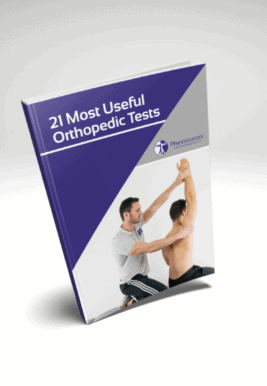Learn
Ely’s Test | Rectus Femoris Contracture | Rectus Femoris Length
The Ely’s Test is an orthopedic muscle length test to assess the flexibility of the rectus femoris muscle which runs from the anterior inferior iliac spine (AIIS) to the tibial tuberosity, thus crossing the hip and knee joint. Peeler et al. (2008) evaluated the test’s intra-and inter-rater reliability. When the test was scored as either positive or negative intra-rater k was 0.52, with an inter-rater k of 0.46, which means that the reliability is moderate. When a goniometer was used, the intra-rater ICC was 0.69 and the inter-rater ICC 0.66, so slightly better.
To perform the test, the patient is in prone lying position. Then, the examiner passively flexes the patient’s knee maximally.
This test is scored positive, if the the patient spontaneously flexes the hip upon maximal knee flexion to compensate for a shortened rectus femoris at the knee or experiences pain during the test
21 OF THE MOST USEFUL ORTHOPAEDIC TESTS IN CLINICAL PRACTICE

Other common muscle length tests are:
- Thomas Test (Iliopsoas Length)
- Kendall Test (Rectus Femoris Length)
- 90-90-Straight Leg Raise Test (Hamstring Length)
- Phelp’s Test (Gracilis Length)
- Ober’s Test (Tensor Fascia Latae / Iliotibial Band Length)
- Piriformis Test (Piriformis Length)
- Patrick’s Test (Adductor Longus Length)
Like what you’re learning?
BUY THE FULL PHYSIOTUTORS ASSESSMENT BOOK
- 600+ Pages e-Book
- Interactive Content (Direct Video Demonstration, PubMed articles)
- Statistical Values for all Special Tests from the latest research
- Available in 🇬🇧 🇩🇪 🇫🇷 🇪🇸 🇮🇹 🇵🇹 🇹🇷
- And much more!








